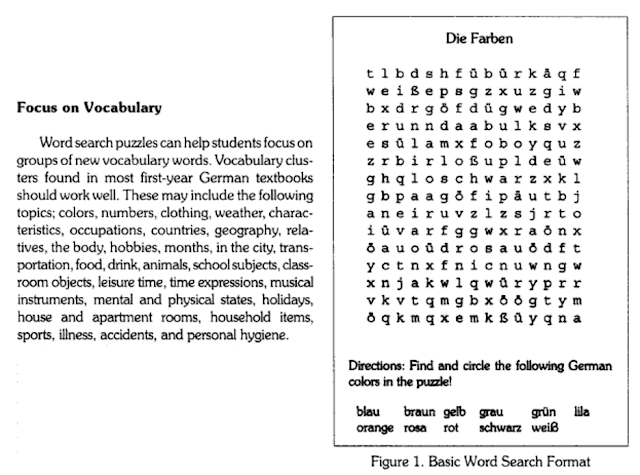A Word Search in DepEd's K to 12 Learning Module
Whether word search puzzles have an educational value is not supported by evidence from research. Word search puzzles focus mainly on how words appear, doing nothing about what the words actually mean. In Through The Eyes of Students: High School Students' Perspectives on Character Education, Michael Romanowski highlights a thoughtful comment from a student:
"...They are teaching us how to be nice to people so they give us a word search. You don't learn how to be nice people by doing a word search...."Dr. Joanne Meier likewise addresses the question, "Are word searches a waste of instructional time?" in ReadingRockets:
Question:
We were recently told by an administrator that research shows that crossword puzzles and word search puzzles have no educational value. We have been forbidden to use them in our classes. As teacher of English Language Learners, we have found that both of these are valuable tools to use with our kids. Do you know of any research that would support our position?
My answer:German teacher Jay P. Kunz finds some pedagogical use for word searches. He hypothesizes that such activity may help students become familiar with foreign words. An example is provided by Kunz in which German words for colors are hidden in a grid of letters:
Your question is an interesting one! I know of no research that supports the use of word searches with students as a means to student achievement. That makes sense to me, though...few skills that translate to reading and writing are developed through their use. I guess one could build an argument that there are some near-point (i.e., copying) skills being used, but the relationship of near-point skills to reading isn't very strong.
Crossword puzzles, however, seem entirely different, especially if students are not provided with a bank of words to use with the puzzle. I think an argument could be made for vocabulary development through their use. You might want to see if your administrator could elaborate on his or her concerns about crossword puzzles.
 |
| Above copied from Jay P. Kunz. Die Unterrichtspraxis / Teaching GermanVol. 35, No. 2 (Autumn, 2002), pp. 148-153 |
Nonetheless, even Kunz' work does not provide evidence that word searches help in student learning.
In the Philippines, with the introduction of DepEd's K to 12, new learning materials have been produced. One of these new resources is a learning module on Household Services:
The module basically supports instruction on how to become a maid. The module not only provides information on this subject but also assessment tools. The following are supposed to inform the student of his or her prior understanding of household services:
There is clearly no relationship between the above word search and a student's knowledge about maintaining a professional image. The above is indeed a glaring example of an utter waste of time and resources.



Comments
Post a Comment